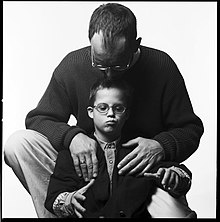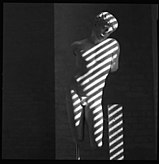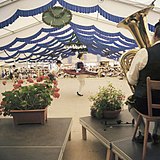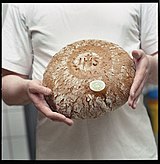
The Eisbach is a 2-kilometre-long (1.2 mi) man-made river in Munich. It flows through the Englischer Garten park, and is a side arm of the Isar River. An artificial wave has been created on one section, which is popular among river surfers.
The Geschwister-Scholl-Preis is a literary prize which is awarded annually by the Bavarian chapter of the Börsenverein des Deutschen Buchhandels and the city of Munich. Every year, a book is honoured, which "shows intellectual independence and supports civil freedom, moral, intellectual and aesthetic courage and that gives an important impulse to the present awareness of responsibility".
Siegfried Mauser is a German pianist, academic and music manager. In 2016, 2017, and 2018, German courts convicted him as a multiple sex offender.
Walter Blume was a German kapellmeister, music critic, and scholar of Johannes Brahms.

The Munich Secession was an association of visual artists who broke away from the mainstream Munich Artists' Association in 1892, to promote and defend their art in the face of what they considered official paternalism and its conservative policies. They acted as a form of cooperative, using their influence to assure their economic survival and obtain commissions. In 1901, the association split again when some dissatisfied members formed the group Phalanx. Another split occurred in 1913, with the founding of the New Munich Secession.

The Munich Film Archive, in the Munich Stadtmuseum, is one of eight film museums in Germany. It has no showrooms and is limited to screening the films in a single cinema with 165 seats, as well as collecting, archiving, and restoring film copies. All analog and digital formats can be shown.

Luise Kinseher is a German cabaret artist and actress.
Hohenzollernstraße is a two-kilometer-long street in Munich's Schwabing district.
The Feilitzschstraße is a roughly 450-meter-long street in Munich's Schwabing district. After the incorporation of Schwabing to Munich in 1891, it was renamed after the Bavarian State Interior Minister, Maximilian von Feilitzsch (1834–1913) in order to avoid confusion with the Maffeistraße in the old town.
Georg Reismüller was a German librarian. He was the Director-General of the Bavarian State Library from 1929 to 1935.
Herzogstraße is a 1.8-kilometer-long street in Munich's Schwabing district. The street's name came from Duke Maximilian Emanuel in Bavaria.
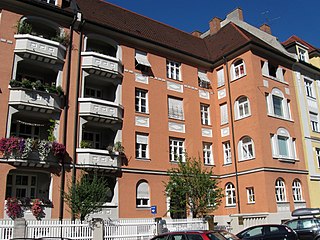
Clemensstraße is a 1.76-kilometer-long street in Munich's Schwabing district. The street, named after Clemens August of Bavaria (1700–1761), labeled under the term Green Axis Schwabing is a participative model project for all Munich municipalities and Munich's longest bicycle road.

Silvia Görres was a German psychotherapist and author. In 1967 she became involved as a volunteer with Lebenshilfe München, a regional charity involved in mental health. Starting in 1971 she became chair of the organisation's Bavarian executive board, successfully backing a number of projects and practical initiatives to improve the quality of life for the mentally impaired.

The Bahnwärter Thiel is a techno club, music venue and alternative cultural center in Munich, Germany. It is named after the novella "Bahnwärter Thiel" by German author Gerhart Hauptmann.
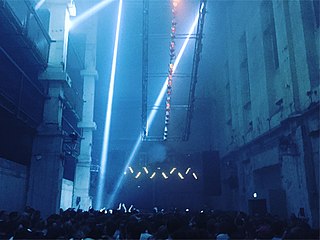
MMA Club(Mixed Munich Arts Club) was a techno nightclub in Munich, Germany, renowned as one of the best in Germany in the 2010s. It was a multifaceted establishment based inside the husk of an old thermal power plant and has hosted underground techno DJs such as Richie Hawtin, Adam Beyer, Len Faki, Ben Klock, Marcel Dettmann, Ben Sims or Terence Fixmer, among many others. The maze-like club also contained a 460-square-meter gallery space frequently utilized for a variety of theatrical, artistic and orchestral performances.

Ursula Männle is a German Social sciences academic and politician (CSU). She served between 1983 and 1994 as a member of the Bundestag. More recently, between 2000 and 2013, she was a member of the Bavarian Landtag, chairing an important parliamentary committee and, till 2009, chairing the women's working group in the Landtag.

SAP Garden is a planned 12,500-seat indoor arena, to be built in Olympiapark, Munich. It will not be completed until spring 2024 at the earliest. The site will be built at the location of the former Radstadion which was demolished in 2015. It will become the home rink to ice hockey team EHC Red Bull Munich and home court to basketball team Bayern Munich.

Jürgen Knauss is a German entrepreneur, marketer and photographer.

Mahbuba Elham Maqsoodi is a German-Afghan artist based in Munich, Germany. She is recognized for miniature paintings and painting on glass, including designing 34 stained glass windows for Tholey Abbey in Germany. She is an advocate for women's rights, a published author, and received a PhD in Art History.

The Monacensia, or Monacensia in Hildebrandhaus, is the literary archive and a research library of the city of Munich, the capital of Bavaria, Germany, which is devoted to preserving and providing public access to the city's cultural history. The name Monacensia is derived from the Latin name for Munich.

